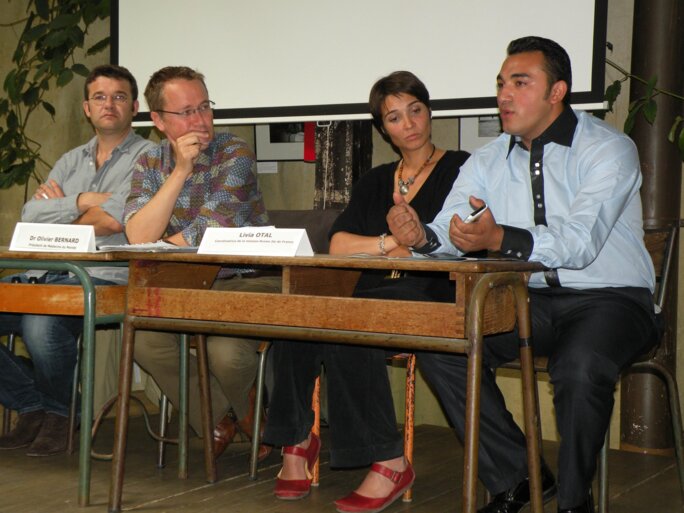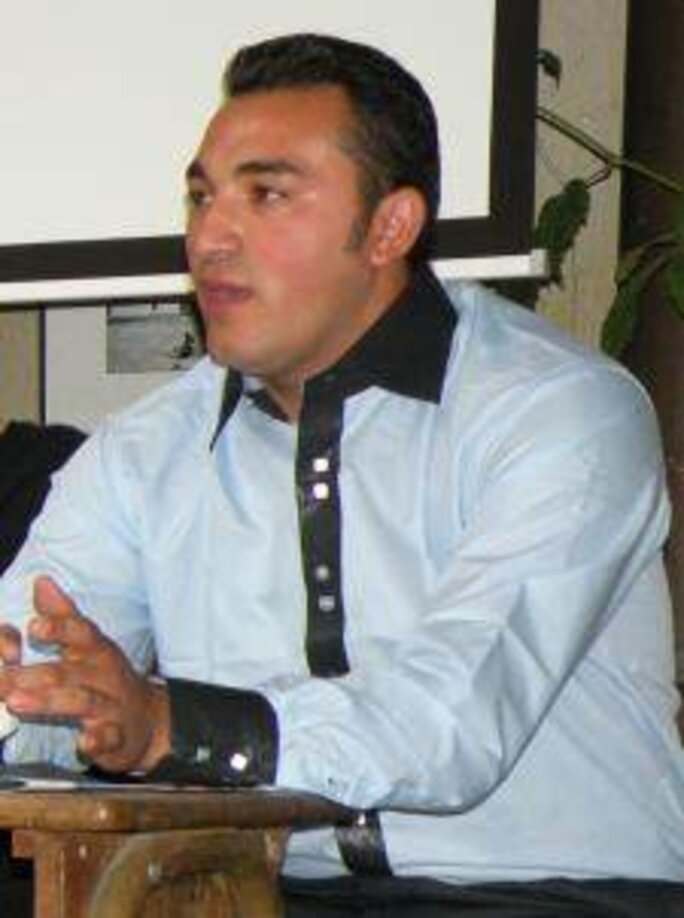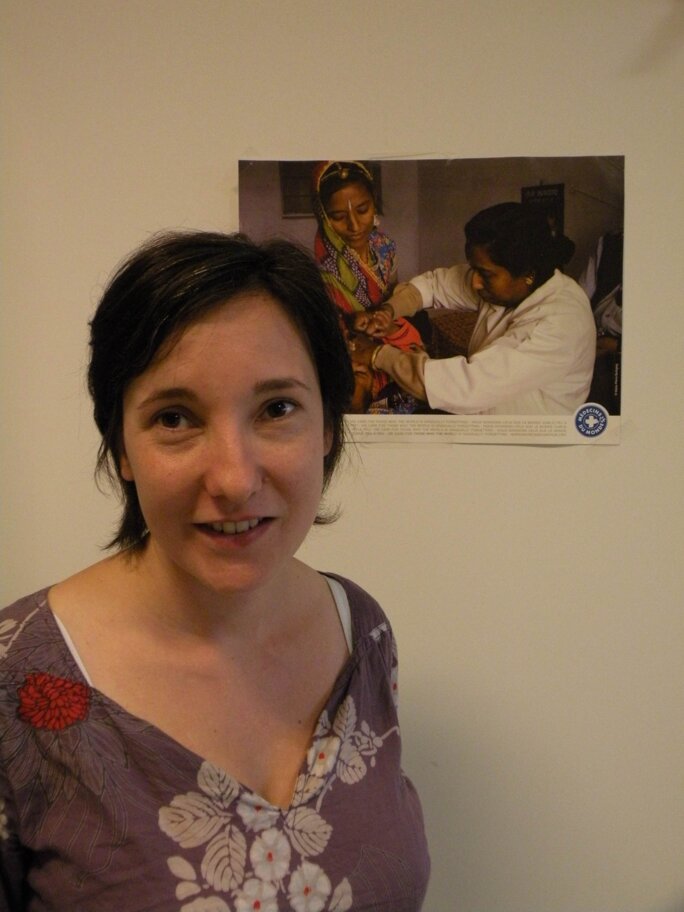A year ago President Nicolas Sarkozy laid down a tough new policy towards Roma gypsy migrants in France that aroused a national and international outcry, when it was even compared with the treatment of Jews during the Second World War. One year after his speech, Mediapart visited a camp north of Paris with Médecins du Monde, the ‘French doctors' charity that has worked with the Roma community for decades, and with local authorities. We were asked not to reveal the camp's exact location or take any still photos or video. We found squalor and desperation, but also people trying to maintain a normality despite their precarious existence. Cécile Alibert reports.
-------------------------
President Nicolas Sarkozy set the tone in July 2010. "The rule is clear: illegal immigrants must be sent back to their own country," he said in a controversial speech in Grenoble (click on video below). Roma camps, he said, were "zones beyond the reach of the law that cannot be tolerated in France."
One year on, Mediapart visited a Roma camp with the charitable association Médecins du Monde, which had planned to run a vaccination campaign that day. But the charity's doctors quickly discovered that injections against measles were not the principal problem.
Practically all the children were ill with diarrhoea. "They must eat only rice and carrots, nothing else," Dr Jeanine Rochefort, a doctor with Médecins du Monde, instructed repeatedly.
The charity's doctors have difficulty following children or adults in the camp properly. This Roma group has been expelled six times since the beginning of this year, and each time the addresses of health centres, vaccination records and medicines are lost, sometimes with serious consequences.

Enlargement : Illustration 2

Two days before Mediapart's visit to the camp, Médecins du Monde had published a highly critical report on the government's deportation policy for the anniversary of Sarkozy's speech, saying the crackdown on the Roma, who mostly come from Romania and Bulgaria, had led to a big rise in "pressure and intimidation" from the police, firebomb attacks on gypsy sites and the spread of disease within the community. Campaigners warned of an intensification of camp clearances in the summer months.
"Expulsions of people from the places they live are more frequent and harsher, and they have an impact on people's health," Olivier Bernard, president of Médecins du Monde, told a news conference on the report.
Expulsions not only create stress, they also mean that people stop medical treatments and pregnant women are no longer followed medically. Nine out of ten Roma women have no medical support during pregnancy, and neo-natal mortality among them is nine times the French average.
The Roma's precarious existence also affects vaccination campaigns. Médecins du Monde found a very low rate of vaccination among Roma groups in France, with only 8% of people surveyed saying they were up to date with their vaccinations. This could presage "the return of diseases from another time, like tuberculosis," said Jean-François Corty, campaigns director for France at the charity.
Food, water, become hard to get after Sarkozy measures
Médecins du Monde introduced Mediapart to Alin, aged 20, a young Roma who defies the usual stereotypes of his people. He has gel in his hair and is wearing shiny black shoes and a smart blue shirt - an image Médecins du Monde is keen to project to help break down prejudice against the Roma. He has done a series of interviews since the news conference.
Alin learnt French at school in Romania and then in France. He arrived here in 1999 and lived in various places in the Paris region before settling in a camp at La Courneuve, a down-at-heel suburb of northern Paris.

Life has got harder since Sarkozy's speech, he said. "Before, we would get water from the fire hydrant but now the police prevent us from doing so. We have to go further and further to find water, ask people or go into cafés." Food is also a constant problem. "We have to buy it because people don't give us any."
These conditions hit children hardest, he said. There were 20 children from the camp who went to school, but they got beaten up by other school children and came back to the camp.
Alin himself earns a living however he can. Mostly he collects scrap iron and sells it on.
The desperation of the Roma's situation is a direct result of the measures Sarkozy announced in Grenoble. These included dismantling half the illegal camps within three months; speeding up procedures for razing them to the ground; and preventing Roma from getting repatriation aid more than once.
In September last year Brice Hortefeux, then interior minister, told the National Assembly that 441 illegal camps out of the 741 on official records in July 2010 had already been dismantled. By February this year, 70% of such camps had been evacuated, including 118 of the 190 in the Ile de France region around Paris, he later told daily Le Parisien. This figure has now risen to 75%, the ministry has since told Agence France Presse.
For those Roma who are in France without the proper papers to stay, expulsion from camps is followed by deportation to their country of origin. A register set up last year called OSCAR (Outil de Statistique et de Contrôle de l'Aide au Retour, a statistical tool allowing checking of repatriation aid) contains the fingerprints of all those who have been allocated aid for returning to their countries, which prevents them from re-applying.
Despite mud and rubbish, dwellings are clean inside
The French government body in charge of legal immigration, OFII (Observatoire Français de l'Immigration et de l'Intégration), said in its 2010 annual report that spending on aid for voluntary repatriation had risen 37.9% during the year. Most of the aid granted went to Romanian and Bulgarian nationals, in similar numbers to 2009, the report says.
This confirms figures from the Interior Ministry, which says that in 2009, 9,300 Romanians and Bulgarians were expelled from France, while in 2010 the figure was 9,529.
In fact, the number of Roma in France has hardly changed over the past several years, campaigners say. According to Bernard of Médecins du Monde there are currently about 15,000 Roma in France, mainly from Romania and Bulgaria. A third live in the greater Paris region, and the others are concentrated in and around the major cities like Marseille, Lille, Lyon and Nantes.
The last wave of Roma migration goes back to the 1990s and the fall of the Soviet Union, said Marilisa Fantacci, coordinator of the Collectif National Droits de l'Homme Romeurope, a group that campaigns for Roma rights. Even the entry of Romania and Bulgaria into the European Union in 2007 did not result in an increase in Roma migration to France.
But since those countries became members of the bloc, with its open labour market and borders, temporary regulations have been brought in limiting exactly these rights for their nationals in France and nine other EU countries. France wants to extend the temporary regulations until the end of 2013, saying that lifting them would create serious imbalances in the French labour market.
However, Fantaccicontests this, saying there are only an estimated 4,000 to 6,000 Bulgarians and Romanians would seek work in France, a drop in the ocean compared to the 4 million registered unemployed in the country. In Spain, she added, there were no serious consequences when such temporary measures were lifted in 2009.
No employment usually also means no social integration. The Roma remain ostracised from society and cooped up in camps which Fantacci compares to shanty towns, like the camp Mediapart visited north of Paris.
Here there are around 200 people of Romanian origin, half of whom are children. The camp is hidden from outside view by sheets of corrugated iron. Within these "walls" are shacks made of wood, caravans and tents. The ground is muddy, there are plastic bottles lying around and electric wires hanging down. A fridge stands in a corner. A few yards away there is a coffee machine. At the furthest edge is an open-air rubbish dump.
This is the image the group's leader does not want to propagate in the media, not because he is ashamed of it but because he is fed up with the prevailing view that all Roma live in squalor.
On taking a closer look, however, there are positive signs in the camp. Although from the outdoors everything looks neglected, indoors the dwellings are clean and tidy. Beds are made, blankets folded. Children are playing and laughing in the alleys. There are smiles on some faces.
There is a man walking around wearing a cowboy hat. The women wear long, colourful dresses. Some of them dye their hair, wear earrings and sport the latest fashion in open summer shoes. "Shoes cost five euros at the market and the hairdresser at the end of the road charges 12 euros," says Vasilica, a mother of three who is nearly 26 and speaks some French.
Like Alin, Vasilica left Romania around ten years ago to escape from poverty. She lived in Spain for seven years before coming to France. "Living here is harder. In Spain there is financial help for school, buying food and clothes. Here, I wash car windows and beg."
Nevertheless, she cannot envisage returning to Romania. Alin says the situation in Eastern Europe is no better than at the end of the 1990s. "My parents went back to Romania a year ago because they are getting too old, but it is really hard...There is no work, wages are low, around 250 euros a month, food is expensive, family allowances have gone down and children cannot go to school any more because there is no money."
Police cite petty crime, Roma cite harassment

Enlargement : Illustration 4

Alin has difficulty getting to sleep at night because the police might come at any time. But for the groups of Roma, there is an added fear - police harassment.
In Seine-Saint-Denis, the département (equivalent to a county) near Paris where La Courneuve is situated and which has the biggest Roma population in France, expulsions were already frequent before Sarkozy's speech. But since then, harassment of Roma by the police has been an added factor, according to Jalila Bouzid, coordinator of campaigns in poor suburbs for Médecins du Monde.
In the southern city of Marseille there has been a massive wave of expulsions of Roma since the President's speech a year ago, accompanied by police harassment which had not been there before, said Cendrine Labaume, the charity's Marseille coordinator.
"What is new is that the Roma are not allowed to find shelter, to shelter under tents or tarpaulins. When they are expelled from somewhere, they go a few metres [yards] further on and settle in on the pavement," she said.
The result is worsening living conditions and inconvenience for neighbours. Labaume points to a "flagrant absence of sympathy", which she puts down to the insanitary conditions created. "At the end of the day the Roma suffer, but so do those who live nearby."
Some Roma also allege worse behaviour than just harassment. They say police officers hit them or use tear gas, even when there are children present. But this is denied by Yannick Danio, national representative for the Unité SGP Police trade union.
"There is nothing new about accusing the police of violence," he said. "There is a kind of inverse racism against the police. If a police officer committed this kind of act, he would be disciplined." But he did not exclude the possibility of harassment, saying the police have been given quotas to fill.
Danio also said the Roma used a form of harassment themselves. "They get petitions signed, they pretend to be deaf and dumb...People are fed up with this type of behaviour. And that doesn't take into account petty crime."
Various figures for petty crime allegedly committed by Roma have been published in France. Agence France-Presse on July 22 reported a police study that said petty crime "by Romanian nationals" had increased by 72.4%in the Paris region in the first half of 2011 compared with a year earlier.
It said 5,680 Romanians, overwhelmingly minors, were involved in petty theft compared with 3,294 in the same period of 2010. Brice Hortefeux, when interior minister, had said a year earlier that acts of delinquency perpetrated by Romanians in Paris had "increased by 259% in 18 months."
Such statistics not only stigmatise a category of the population, they also cover all Romanian nationals and not purely Roma, since it is illegal to gather ethnic statistics in France, Danio said.
Damien Nantes, director of the association Hors la Rue,which protects minors from immigrant families, offers other explanations for the seeming increase in petty crime attributed to the Roma. It could simply derive from attempts to keep a closer watch on a particular category of the population, he said.
There is also a major issue missing from the study, he said - the exploitation of children. "They are first of all victims rather than delinquents."
"The current measures oblige people who have a sedentary culture to become nomads," Nantes said. "They have no work, they are not part of the social fabric, which forces them to use survival tactics. They are vulnerable and can be exploited."
-------------------------
English version: Sue Landau
(Editing by Graham Tearse)


